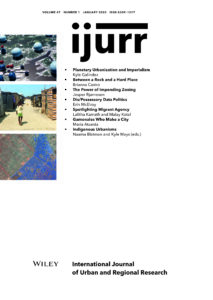Indigenous urbanism is an analytic and vital experience that captures everyday life and extreme moments of conflict in settler colonies. While highly localized, Indigenous urbanism/s are comparable across time and space. Delivered from different parts of the world, the essays in this collection highlight that Indigenous urbanism is politically, socially and culturally significant not only for Indigenous peoples in cities, but also for urban settlers and non-Indigenous people of color. While Indigenous urbanisms are foregrounded by settler-colonial structures and processes, they also underscore the unresolved nature of social relations in cities, and indeed, the unsettled character of the city itself. This introduction briefly sketches the themes and scope of each essay and draws them into conversation. Taken together, this collection illustrates the relational—rather than reactionary—character of Indigenous urbanisms as structure, in and of the (settler) city. Indigenous urbanisms shape cities by engaging with broader categories of human relations, intimate connections, conflict and resistance.
Details
Written by:
Naama Blatman & Kyle Mays
Digital Object Identifier (DOI)
https://doi.org/10.1111/1468-2427.13128
About DOI

